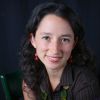Building a Deeply Holistic Jewish Education
Reflections from a recipient of the Diller educator awards
“Can you eat off that? Do they give you health insurance?” That was a consistent topic of conversation when I started in this field – Jewish informal education. On October 20, 2015, I was standing with three other remarkable Jewish educators being recognized as a recipient of the Helen Diller Award for Excellence in Jewish Education. And it wasn’t just a nice thank you dinner with inspirational speakers, it was also $10K and a good amount of visibility in the community.
Receiving the Diller Award meant an incredible amount to me. It meant the recognition of the Bay Area Jewish community as an emerging educational leader, the sincere appreciation of Urban Adamah, my nominating organization, and a chance to speak about the work I feel most passionate about in a room of people deeply invested in Jewish learning. I got to celebrate my place at the table with the people who have believed in the educational work I do – my family, my partner, my closest friends, and my boss.
A resounding theme amongst many of us in the room who spoke was that we not only can, but need to, be designing, delivering, funding, and researching a Jewish education that is deeply holistic and developmentally-based, an education that is meaningful, relevant, and helps children find their place in community.

The odds that youth find their place in the great chain of being are not so clear these days. The dominant culture does not teach people about wholeness or relationships.
Americans spend an average 90% of their time indoors. As such, we mostly interact with inert objects that we fully project our desires onto with little recourse. Screens are becoming more interesting than the real world, and we have an upcoming generation of “containerized kids” who go from a crib, to a high chair, to a car seat, to a stroller, to a school chair and, if they are lucky later in life, to a comfortable office chair. (via Richard Louv's Last Child in the Woods: Saving Children from Nature-Deficit Disorder.)
Are the Jewish educational experiences we offer helping children and youth explore the most important life questions, questions such as “Am I powerful? Am I capable?” “Who is my community?” “To whom, and for what am I responsible?” and “How do I use my power?”
I’ve found integrating Jewish learning and nature-connection to be the most powerful way to focus on these essentials. Recently coined “JOFEE” (Jewish Outdoors Food and Environmental Education), this work is now being pioneered and professionalized across the Jewish world, and is changing the expression and experience of Judaism in our time.
The links are not so hard to make – from the way our major holidays are based on the agricultural cycle and community values, to the many environmentally-oriented mitzvot that help us articulate our relationship to food, those who hunger, and the earth’s resources. When nature and Jewish tradition come together, I see youth and families more fully experience wonder, gratitude, interconnectedness, responsibility, and caring community.
As Rabbi Heschel once aptly put it:
“Human beings have indeed become primarily tool-making animals, and the world is now a gigantic tool box for the satisfaction of their needs... Nature is a tool box in a world that does not point beyond itself. It is when nature is sensed as mystery and grandeur that it calls upon us to look beyond it.”
The time is ripe for all us Jewish educators to refine our pedagogic toolboxes, whatever they may be, and assess what our deeper aims are.
I’m so blessed to be a part of this exciting time in Jewish education, to be recognized, supported, and invited further into the thousands-of-years-old tradition of Jewish learning and teaching.

2015 Helen Diller Award for Excellence in Jewish Education
Ariela Ronay-Jinich is the director of youth and family programs at Urban Adamah and one of four 2015 recipients of the Helen Diller Family Award for Excellence in Education, an award that comes with $10,000 for the individual and $2,500 to the educational institution in which she works.


